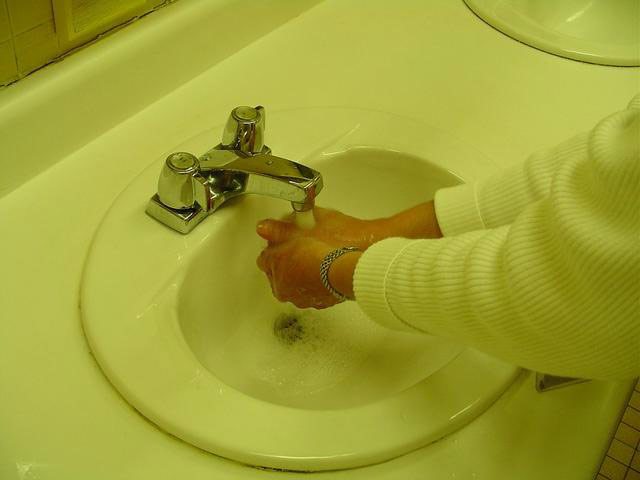
Do Americans have cleaner hands than Brits?

Those self-deprecating Brits are at it again, this time publicizing their own lackluster hand-washing habits.
A BBC report titled "Why are the British so bad at washing their hands?" claims that "the British are particularly bad [about washing hands]" and quotes hygiene experts as saying the British approach to hand washing is often "bizarre" and "peculiar." Are the Brits exaggerating their faults, or do they really have a significantly worse hand-washing record than, say, Americans?
For evidence of Britain's national aversion to hand hygiene, the BBC cited a 2009 report published in the American Journal of Public Medicine. Among a sample of about 200,000 Brits who used a gas-station restroom in the United Kingdom in 2008, only 32 percent of men and 64 percent of women tripped a rigged soap dispenser. (Even so, 99 percent claimed they had washed their hands after using the toilet.)
Related: What did people use before toilet paper was invented?
A 2010 survey by the American Society for Microbiology and the American Cleaning Institute looked at hand-washing habits among 6,028 adult Americans who had used one of five highly trafficked public restrooms around the country, including one in New York City's Penn Station and one in Atlanta's Turner Field baseball stadium. Results showed that overall 77 percent of men and 93 percent of women washed their hands post-toilet. By comparison, 96 percent of Americans in a telephone survey said they always washed their hands after using public restrooms.
But the difference in methodology of the two surveys makes for a risky comparison. The American numbers were based not on hidden data trackers but on the findings of restroom observers who discreetly surveyed other people's washing habits while they pretended to groom themselves. The presence of these observers may have affected hand-washing behaviors. Moreover, the American study found significant variation in hygiene practices based on location, suggesting that a comparison with the gas station might not be fair. (The worst location for American men, in the baseball stadium, saw a hand-washing rate of 65 percent, twice as high as the one registered by British men in the gas station.)
Brian Sansoni, a spokesman for the American Cleaning Institute, a group representing manufacturers of cleaning products, told Life's Little Mysteries that the restroom observers counted only thorough hand washings that involved the use of soap, meaning the two studies' definitions of hand washing were similar. [5 Experts Answer: Does Antibacterial Gel Work as Well as Washing Your Hands?]
Sign up for the Live Science daily newsletter now
Get the world’s most fascinating discoveries delivered straight to your inbox.
In a more direct comparison of British and American habits, Harvard University scientists looked at the ways hygiene behaviors varied internationally after the onset of the H1N1 flu pandemic in 2009.
Of the five nationalities surveyed, the British were the least likely to report an increase in washing their hands or using hand sanitizer after news of the flu outbreak. Fifty-three percent of Brits surveyed said they took these protective measures, compared with 89 percent in Argentina, 86 percent in Mexico, and 72 percent in Japan and the United States.
Whether or not the data gives Americans the right to give a hygienic shaming to their neighbors across the pond, it might be just what the doctor ordered. The same study that established the baseline rates of hand washing in a United Kingdom gas station went on to investigate how those rates changed when people were confronted with a variety of messages promoting hand washing before they entered the restroom.
The message that improved hand-washing behaviors the most was: "Is the person next to you washing with soap?"
Originally published on Live Science.










